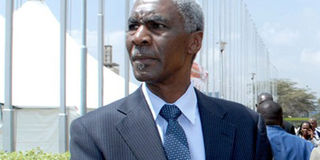Breaking News: At least 10 feared to have drowned in Makueni river
Personal reasons that drove spy boss to quit

Intelligence chief Michael Gichangi’s career in the security sector has been forcefully thrust into the public limelight in recent times by the hand-wringing frustrations of his last posting. PHOTO | SALATON NJAU | FILE
What you need to know:
- Even before Kenya teetered on the brink of civil war in 2008, Mr Gichangi had known about illegally armed groups planning to attack communities and warned the police about it to no avail.
- Little could get Mr Gichangi to give up his service to his country and the opportunity to chat conspiratorially with the President about this and that.
As personal crises go, few can match the domino effect produced by the one Maj-General Michael Gichangi suffered when he elected to resign this week as the national spy agency boss.
In commiseration, the President has subsequently had to change work stations for 34 senior civil servants and diplomats even as Mr Gichangi continues to hold fort before his replacement at the National Intelligence Service is sought.
Significantly, the second level command of the national security infrastructure has changed with the Defence and Interior principal secretaries trading places.
Mr Gichangi’s career in the security sector, where he has served for over 40 years, has been forcefully thrust into the public limelight in recent times by the hand-wringing frustrations of his last posting.
Before murderous attackers descended on Mpeketoni in Lamu and killed over 60 people two months ago, Mr Gichangi knew what they were up to and whispered it to all the right people, perhaps mentioning it casually to the President over the daily breakfast gossip.
The spy chief had similarly known in advance that some very bad Al-Shabaab people were planning to lay siege on the Westgate Mall in Nairobi, in which 67 people were killed, and probably said something to the powers that be.
Even before Kenya teetered on the brink of civil war in 2008, Mr Gichangi had known about illegally armed groups planning to attack communities and warned the police about it to no avail. In that conflagration, 1,133 people were killed.
One can only idly wonder if telling the media if the Presidents in office were warned alongside everybody else of the events in the recent past that has defined national security.
The Commission of Inquiry into the Post-Election Violence fingered NIS’s predecessor — the National Security Intelligence Service — for partisanship and interfering in the 2007 elections. Similar claims have been made about the service in the 2013 elections.
CHAT CONSPIRATORIALLY
One gets the impression that as suspected terrorists set off explosives in bars, churches, buses and open air markets, and as two important national leaders died in yet-to-be explained circumstances, the National
Intelligence Service was able to maintain objective distance from these incidents.
Each of these events probably stirred up a chorus for his resignation but that did not constitute reason personal enough to invite Mr Gichangi to resign.
Little could get Mr Gichangi to give up his service to his country and the opportunity to chat conspiratorially with the President about this and that. Certainly not the whispering campaign by the Americans – exposed through the website Wikileaks — about his unsuitability for the job he held.
Once, when Prime Minister Raila Odinga tried to block his reappointment — and told him that he would not be recommending him when his first five-year term expired in 2011 because he was not sharing intelligence, Mr Gichangi had no personal reasons to leave. He reportedly crossed the road to the Cabinet Office from where the renewal of his tenure was swiftly announced.
Since then, the NIS has declined to take an interest in drug trafficking or the people involved, and has no clue who the sugar barons who smuggle the product into the country are.
It was never personal. One can only hope that the personal reasons that drove the Director-General of the NIS to finally give the President his letter of resignation do not stay with him too long so that he can continue to contribute to national safety in a new role.





